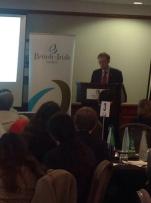
On 7-8th November, the Scottish Government hosted the British-Irish Council’s IML legislation seminar in Edinburgh. Dr Alasdair Allan MSP, Minister for Learning, Science and Scotland’s Languages opened the seminar with a keynote address and welcomed delegates in English, Scots, Gaelic, Irish and Welsh. Dr Allan MSP stated:
“When we were considering the Gaelic Language (Scotland) Act during its progress through the Scottish Parliament we looked to learn from other Administrations including Wales and Ireland. I hope that will continue to learn from each other.”
Professor Rob Dunbar in his presentation on “What constitutes good legislation?” reminded the seminar that language legislation was very new and still a developing area. Professor Dunbar suggested that legislation needed to be:
Effective, efficient, equitable, evident and enforceable.
Bethan Webb and Iwan Evans, Welsh Government spoke on the recent language legislation in Wales with particular emphasis on the practicalities of implementation. The Welsh Language (Wales) Measure 2011 gave official status for Welsh in Wales and set out duties for organisations to prepare Welsh Language Standards for: service delivery, policy making, operational, promotion and record-keeping. The Measure also established the office of the Welsh Language Commissioner.
Máire Killoran, Irish Government, spoke about recent developments and proposals in regard to language legislation in Ireland. Her presentation focused on the 20-Year Strategy for the Irish Language 2010-2030, which is underpinned by three key legislative strands, firstly, the constitutional position; secondly, the Official Languages Act 2003; and thirdly, the Gaeltacht Act 2012. The objective of Government policy in relation to Irish is to increase on an incremental basis its use and knowledge as a community language. Specifically, the Government’s aim is to ensure that as many citizens as possible are bilingual in both Irish and English. It is an integral component of the Government’s Irish language policy that close attention be given to its place in the Gaeltacht.
Verona Ni Dhrisceoil, University of Sussex, spoke on the position of Irish following the Official Languages Act 2003- strengthened in law, but in recent years had seen difficulties with public bodies delivering their services in Irish. Language rights reflected in legislation were not passive rights, but could only be enjoyed if services were provided. She also discussed the review of the languages act.
The seminar then looked at the “smaller” languages. Dr Julia Sallabank, SAOS, University of London discussed the legislative and policy position of Manx, Jèrriais and Guernesiais in the crown dependencies. She discussed the different stakeholders of IML, issues of “top down, bottom up” drivers in language use and reasons for promotion of IML and on the effectiveness/ limitations of language legislation.
Edoardo McKenna, University of Aberdeen, discussed the position of the Scots language in relation to the European charter for Regional and Minority Languages and advocated the greater use and acceptance of Scots in the education and legal systems in Scotland. He discussed the level of financial support given for Scots by the Scottish Government and how best to meet the service delivery needs of Scots speaking citizens.
Dr Guy Puzey, University of Edinburgh, outlined the development of Sámi language policies in Nordic countries, with particular emphasis on Norway. Sámi language rights had been directly linked to Sámi political rights- in some senses the distinctive identity of the Sámi people had been challenged by nation building in countries such as Norway until the late 1980s.Sámi language rights now included the right of use in court proceedings, health and social service and other areas in designated geographical areas only.
Dr Annis May Timpson, University of Edinburgh outlined the linguistic polices of Nuvint province in Canada- the only province of Canada with four official languages- the national languages of English and French and the Inuit languages of Inuktitut and Inuinnaqtun.
Meri Huws, Welsh Language Commissioner, gave her thoughts of her first 18 months as the 1st Welsh Language Commissioner. The office of Commissioner was established by the Welsh Language (Wales) Measure 2011, appointing the Commissioner for a period of 7 year, with no option for renewal. The first organisations in Wales to produce Welsh Language Standards would the Welsh Government, the Welsh local authorities and the Welsh National Parks. The Standards were required to be submitted by November 2013 and would be published on 6 January 2014. Other bodies that will be covered by Welsh Language Standards will include Third Sector bodies that deliver more than £400,000 of services for the public sector and private sector utilities.
Welsh Ministers were required to pay “due regard” to the Commissioner’s advice. Meri Huws stressed the need for language to be included in all legislation and on the face of the bill (primary legislation), rather than in secondary legislation. The Office of the Commissioner was both an advocate for the Welsh language, but also a regulator- it was importantly organisationally that there was a clear distinction between the two roles.
Emyr Lewis, Cardiff University, considered the impact of the European Charter for Regional and Minority Languages both across Europe and in the UK. Issues covered both over-ratification and under-ratification, the languages or dialects conundrum and territorial application of languages.
Gari Lewis, Welsh Government spoke on the School Standards and Organisation (Wales) Act 2013 as an example of mainstreaming languages into other legislations and policies. The new Act moves the driver for Welsh Medium Education away from purely parental demand in anglicised areas and 3 proactive local authorities to 3 year Welsh in Education Strategic Plans from local authorities, subject to annual review by the Welsh Government. One important aim of the Act was to better align local provision of Welsh Medium Education to parental demand.
Note the views recorded from the seminar do not necessarily reflect the views of the British-Irish Council’s member administrations.












